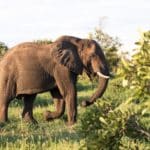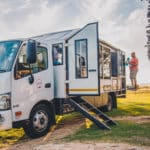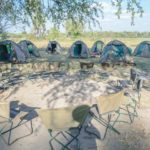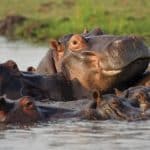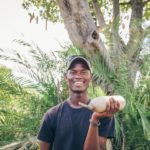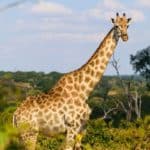Experience Southern Africa
Explore Southern Africa, embarking from Johannesburg and journeying through the Kruger National Park, and Victoria Falls, before circling back to South Africa via the Okavango Delta, and the Khama Rhino Sanctuary. This adventure promises golden sunsets, remote wilderness camping, thrilling safaris, and serene river cruises teeming with iconic wildlife. Traverse South Africa, Botswana, and Zimbabwe and be amazed by powerful waterfalls, enchanted by encounters with endangered species and inspired by the resilience of local communities. Immerse yourself in Southern Africa and depart with newfound inspiration and cherished memories to last a lifetime.
16 days, from
$4,705
per person
GROUP SIZE
ACTIVITY LEVEL
Details
Countries Visited:
Botswana
South Africa
Zimbabwe
Accommodation: Hotel (2 night), Lodge (1 night), Meru Tent (1 night), Permanent Tented Overland Camp (2 night), Camping with facilities (5 nights), Basic Camping with no facilities (2 nights), Guesthouse (1 night)
Transportation: Overland vehicle , Boat , Mokoro , Bicycle , Open Safari Vehicle
Included Meals:
- 15 breakfasts
- 8 lunches
- 11 dinners
Group size: Minimum 1, Max 16
Camp under an Africa sky within Kruger National Park. You can’t get much closer to nature than that!
Spot wildlife in Chobe National Park during a sunset river cruise. This is the time many animals – such as elephants, cheetahs and lions – come to drink so get your cameras ready!
Experience untouched wilderness of Botswana's Okavango Delta by staying on a remote island bush camp. At night, the sounds of the African bush are the only things you will hear.
Visit the only place in Botswana where both the white and black Rhinoceros’ still remain: the Khama Rhino Sanctuary.
Cycle through the colourful streets of Soweto with a local and hear firsthand about the townships’ rough but inspired history.
On this trip you will be accompanied by 3 crew members - Group Leader, Driver and a camp assistant. Your Camp Assistant is responsible for setting up camp and preparing your meals so you can take extra time to relax at the end of your day.
Camping beds/stretchers, sleeping bags, blankets and pillows are provided for camping nights to provide an extra level of comfort.
Itinerary
Sawubona! Welcome to South Africa. Your adventure begins with a welcome meeting at 6 pm where you'll meet your tour leader and fellow travellers. You can arrive at any time as there are no activities planned until this important meeting. If you arrive early, get out and explore this city characterised by remarkable contrasts. Perhaps visit the culturally rich areas of Newtown, Braamfontein or Maboneng. The eye-opening Apartheid Museum is well worth your time.
Depart Johannesburg, the 'City of Gold' and head off on an adventure of a lifetime. A truly unique African experience unfolds as you enter the Greater Kruger National Park ecosystem, arriving at your campsite in time for lunch (approximately 10 hours travel time including stops along the way). One of the largest game reserves in Southern Africa, Kruger National Park is home to over 500 bird species, 100 species of reptile and 150 mammal species, including the Big Five and the endangered African wild dog. Base camp for tonight is in the Guernsey Private Game Reserve on the edge of Kruger National park. Once settled perhaps take the optional night game drive into Kruger National Park.
Rise early for a light breakfast of coffee and rusks before embarking on a morning game drive through Kruger National Park in the overland vehicle. Most of the day will be spent game viewing, birdwatching and stopping at various waterholes and viewpoints. Later on, take a night drive with the park guide for a chance to spot nocturnal animals and perhaps even a night-time predator or two – catch a lion or hyena out hunting, or an impala out in search of a late-night feed. Your camp tonight will be within Kruger National Park. However, sometimes during peak seasons of June, July and December you’ll camp at a nearby site, just outside the gate.
Head out on one last game drive at Kruger National Park for a chance to spot any animals you may have missed yesterday, then settle into your overland vehicle for the 7-hour drive to Masebe Nature Reserve. Characterised by spectacular rock formations that weave between vegetation and rivers, Masebe's uniquely beautiful scenery separates it from other nature reserves and national parks in South Africa. The 4,500-hectare provincial park is also known for its excellent birding and wildlife viewing. Sables, nyala, giraffes, zebras and leopards are just some of the wildlife you may encounter here. Your camp tonight is located within the reserve, providing an extraordinarily tranquil experience.
Begin the day by touring well-preserved, pre-historic rock art found at three sites across Masebe Nature Reserve. Hidden within caves in sandstone cliffs, these ancient paintings were created by the San people (Bushmen) thousands of years ago. While much about these paintings are shrouded in mystery, images of people and animals provide a unique glimpse into how the San lived. Then its back on the road as you travel towards Moremi Gorge. Located near Palapye, the drive will take approximately 6 hours. Settle into your camp on arrival.
Journey from Palapye to Nata (approximately 6 hours). Your campsite is situated on the edge of the amazing Makgadikgadi Salt Pans, covering some 12,000 square kilometres, this is one of the largest salt flats in the world. On arrival, take a 3-hour excursion in an open vehicle to explore these seemingly endless plains. Surrounded by the Kalahari Desert, the pans are naturally dry and salty for a large part of the year. During this time the arid landscape has an eerie feel to it as heat mirages disorientate the senses. Then, after the rains hit, it become a grassy refuge for migratory birds and animals. Tonight, enjoy a good nights rest in a comfortable lodge.
Travel on to Victoria Falls (approximately 4 hours), crossing the border into Zimbabwe in time to have lunch on the banks of the Zambezi. Continue to your permanent tent, set within a large rest camp. After settling in, you may want to set out on a highly recommended optional trip to visit Victoria Falls. Spanning about a mile wide and falling 108 metres into a narrow gorge below, the spray from the falls can sometimes be seen from kilometres away. In the dry season, the view of the falls is unobstructed by spray and it's possible to see little islets in the river below. Otherwise, a range of other activities are available through the local activity centre. After visiting the falls or enjoying a relaxing afternoon, meet up with your group for an included brewery tour and beer to say cheers to the journey so far.
Today is a free day to enjoy the many activities on offer. If you are interested in an optional helicopter flight (12 minute or 25 minute rides), Zambezi Helicopter co CAA Zimbabwe is the only operator that meets Intrepid's safety requirements and that we endorse. Your leader can help you arrange this activity or recommend other activities to make the most of your free day.
Travel to Chobe National Park in Botswana (approximately 3 hours) via the Victoria Falls Wildlife Trust, one of The Intrepid Foundation projects. Here you can learn about the rescue and rehabilitation of wildlife, human-wildlife conflict and their role in anti-poaching. There may also be a chance to meet any rescued or orphaned wildlife currently in their care.
Chobe, the first national park to be established in the country, is perhaps best known for its high concentration of elephants, which can often be seen swimming in the Chobe River. The river also attracts wallowing hippos, a variety of birdlife, and crocodiles which like to sun themselves by the water's edge. Cheetahs and lions also come down to drink. In the late afternoon you will embark on a scenic sunset cruise on the Chobe River guided by an expert local guide – a relaxing way to spend the afternoon. Your camp, located outside of the park, has flush toilets, showers, intermittent WiFi and optional accommodation upgrades.
There's time for a morning game drive for those who would like to further explore this beautiful park (this is optional). As well as elephants, you might see some of Chobe's other noble creatures – from giraffe and zebra to impala and tsessebe. Then it's time to head to Maun (approximately 10–11 hours). This town is the gateway to one of the world's most famous and most complex ecosystems, the Okavango Delta.
Travel into the unspoiled wilderness for an adventurous camping experience. The Okavango Delta is unlike anything in the world – a 16,000 square kilometre maze of wetlands made up of meandering waterways, green islands, lush plains and prolific wildlife. The delta is filled with a diversity of flora and fauna that includes hippos, crocodiles, elephants and big cats. But it's not the animals that are the main attraction – it's the incredible ecosystem. You'll explore the waterways by mokoro, a traditional dugout canoe navigated by friendly local 'polers'. You'll also spend some time exploring on foot with your experienced and knowledgeable guides. Camp on a remote island in the heart of the wild. Toilets will be dug and there are no showers. Hear the nocturnal creatures of the African bush come to life as the sun goes down.
It's an early start this morning as you venture out for a sunrise walk, hoping to catch a glimpse of some elephants and perhaps the fascinating and rather noble-looking Cape buffalo. Return to camp to enjoy some breakfast and reflect on the morning's viewing with your fellow travellers. As it warms up, you'll have the rest of the day to relax. You might like to take a refreshing swim. There is also the option of an afternoon walk or another mokoro trip. You may notice that the mokoros of today are made with fibreglass but retain their original shape – this strikes a balance between tradition and sustainability.
After taking down your camp, it's time to return the mokoro to the poling station and board the vehicle once again. Travel back to Maun (approximately 2–3 hours). Though this town is best known as a stepping stone to the delta, it's worth a stroll around. Perhaps check out the Nhabe Museum if you feel curious and have time.
Travel to the Khama Rhino Sanctuary (approximately 9–10 hours). On the edge of the Kalahari Desert, the Khama Rhino Sanctuary is a community-based conservation project staffed by local village residents. Built in a former hunting area to protect Botswana's only remaining populations of both black and white rhinos, the sanctuary is also home to other wildlife including zebras, giraffes, leopards, ostriches and wildebeest, all of which can be seen around the many natural waterholes. Visiting this project benefits local communities and contributes to the protection of the highly endangered white rhinoceros. In the evening, head out on a dusk game drive in an open safari vehicle with an expert local ranger to see the rhinos (this will be replaced by a dawn game drive if the group arrives at the sanctuary too late). Your camp tonight has shared facilities and optional upgrades.
Cross the border into South Africa and travel on to Soweto, which is located in the Johannesburg area (approximately 10–11 hours). Johannesburg is a sprawling city of remarkable contrasts. As you come into town you'll likely see opulent mansions alongside tin-roof shacks, and verdant city parks alongside the concrete. About half of Jo'burg's 3 million residents live in Soweto and its surrounding areas. Enjoy a relaxing evening upon arrival.
Take to the streets of Soweto on a bicycle and learn about the Soweto uprising and the resistance against apartheid. It's interesting to see how the community has changed and developed into what it is today. You'll also visit a former migrant workers' hostel and stop at many other local landmarks. Your cycling adventure should finish up at around 3 pm today. With no further activities planned, your trip comes to an end at this point. No accommodation is provided for tonight, but this can be arranged when you book this trip. If you are departing, it's best to book a flight for 8 pm or later.
